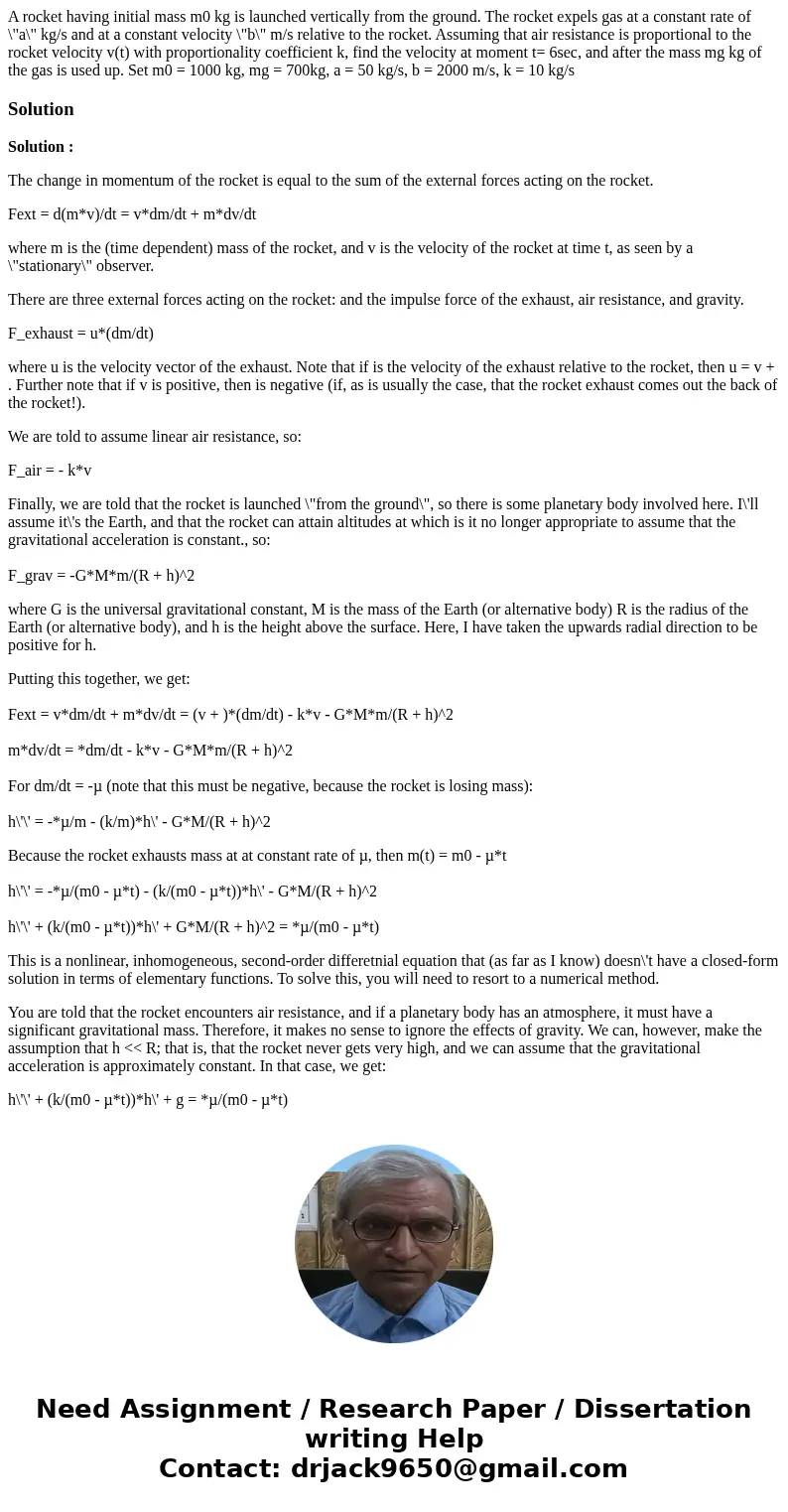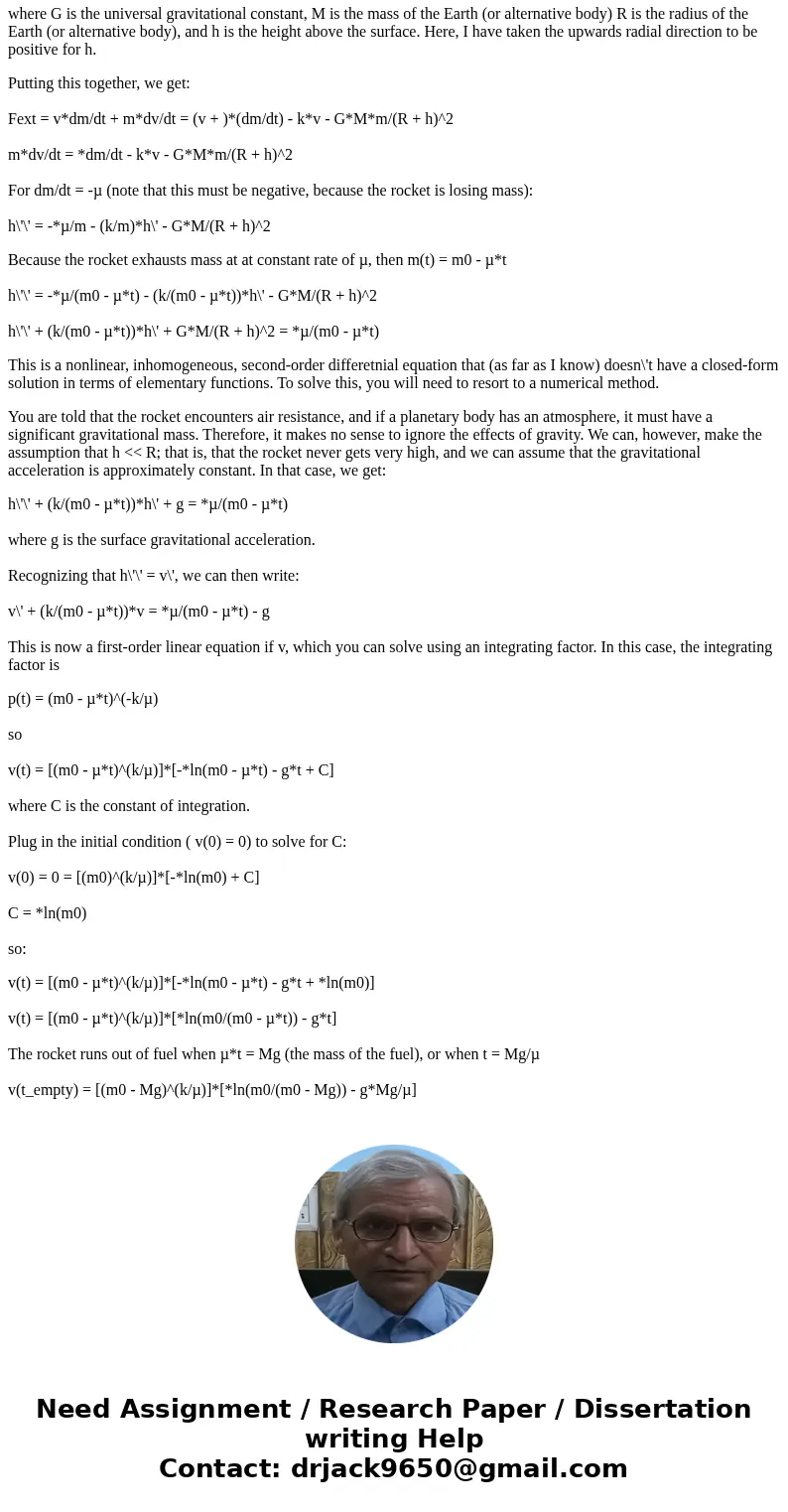A rocket having initial mass m0 kg is launched vertically fr
A rocket having initial mass m0 kg is launched vertically from the ground. The rocket expels gas at a constant rate of \"a\" kg/s and at a constant velocity \"b\" m/s relative to the rocket. Assuming that air resistance is proportional to the rocket velocity v(t) with proportionality coefficient k, find the velocity at moment t= 6sec, and after the mass mg kg of the gas is used up. Set m0 = 1000 kg, mg = 700kg, a = 50 kg/s, b = 2000 m/s, k = 10 kg/s
Solution
Solution :
The change in momentum of the rocket is equal to the sum of the external forces acting on the rocket.
Fext = d(m*v)/dt = v*dm/dt + m*dv/dt
where m is the (time dependent) mass of the rocket, and v is the velocity of the rocket at time t, as seen by a \"stationary\" observer.
There are three external forces acting on the rocket: and the impulse force of the exhaust, air resistance, and gravity.
F_exhaust = u*(dm/dt)
where u is the velocity vector of the exhaust. Note that if is the velocity of the exhaust relative to the rocket, then u = v + . Further note that if v is positive, then is negative (if, as is usually the case, that the rocket exhaust comes out the back of the rocket!).
We are told to assume linear air resistance, so:
F_air = - k*v
Finally, we are told that the rocket is launched \"from the ground\", so there is some planetary body involved here. I\'ll assume it\'s the Earth, and that the rocket can attain altitudes at which is it no longer appropriate to assume that the gravitational acceleration is constant., so:
F_grav = -G*M*m/(R + h)^2
where G is the universal gravitational constant, M is the mass of the Earth (or alternative body) R is the radius of the Earth (or alternative body), and h is the height above the surface. Here, I have taken the upwards radial direction to be positive for h.
Putting this together, we get:
Fext = v*dm/dt + m*dv/dt = (v + )*(dm/dt) - k*v - G*M*m/(R + h)^2
m*dv/dt = *dm/dt - k*v - G*M*m/(R + h)^2
For dm/dt = -µ (note that this must be negative, because the rocket is losing mass):
h\'\' = -*µ/m - (k/m)*h\' - G*M/(R + h)^2
Because the rocket exhausts mass at at constant rate of µ, then m(t) = m0 - µ*t
h\'\' = -*µ/(m0 - µ*t) - (k/(m0 - µ*t))*h\' - G*M/(R + h)^2
h\'\' + (k/(m0 - µ*t))*h\' + G*M/(R + h)^2 = *µ/(m0 - µ*t)
This is a nonlinear, inhomogeneous, second-order differetnial equation that (as far as I know) doesn\'t have a closed-form solution in terms of elementary functions. To solve this, you will need to resort to a numerical method.
You are told that the rocket encounters air resistance, and if a planetary body has an atmosphere, it must have a significant gravitational mass. Therefore, it makes no sense to ignore the effects of gravity. We can, however, make the assumption that h << R; that is, that the rocket never gets very high, and we can assume that the gravitational acceleration is approximately constant. In that case, we get:
h\'\' + (k/(m0 - µ*t))*h\' + g = *µ/(m0 - µ*t)
where g is the surface gravitational acceleration.
Recognizing that h\'\' = v\', we can then write:
v\' + (k/(m0 - µ*t))*v = *µ/(m0 - µ*t) - g
This is now a first-order linear equation if v, which you can solve using an integrating factor. In this case, the integrating factor is
p(t) = (m0 - µ*t)^(-k/µ)
so
v(t) = [(m0 - µ*t)^(k/µ)]*[-*ln(m0 - µ*t) - g*t + C]
where C is the constant of integration.
Plug in the initial condition ( v(0) = 0) to solve for C:
v(0) = 0 = [(m0)^(k/µ)]*[-*ln(m0) + C]
C = *ln(m0)
so:
v(t) = [(m0 - µ*t)^(k/µ)]*[-*ln(m0 - µ*t) - g*t + *ln(m0)]
v(t) = [(m0 - µ*t)^(k/µ)]*[*ln(m0/(m0 - µ*t)) - g*t]
The rocket runs out of fuel when µ*t = Mg (the mass of the fuel), or when t = Mg/µ
v(t_empty) = [(m0 - Mg)^(k/µ)]*[*ln(m0/(m0 - Mg)) - g*Mg/µ]


 Homework Sourse
Homework Sourse